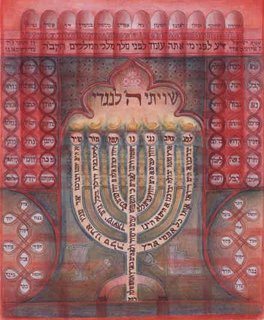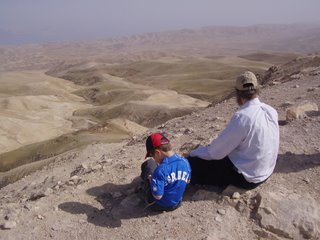Yom Kippur and the Mikveh
Sod Yesharim, Yom Kippur,
By Rabbi Gershon Henoch Hainech of Radzin, ZTs”L,
Translated by Betsalel Edwards
“Rabbi Akiva said, fortunate are you, Israel! Before whom do you purify yourselves? And who is it that purifies you? Your Father in Heaven! As it is said (Ezekiel, 36:25), ‘and I have poured pure water on you and you have been purified,’ and it is said (Jeremiah, 17:13), ‘God is the mikveh of Israel (God is the hope of Israel. The Mishnah is referring to the double entendre of “mikveh,” which means both “ritual bath,” and “hope.”).’ Just as the mikveh purifies the impure, so too does the Holy One, blessed be He, purify Israel.” (Mishnah, Yoma, Chapter 8, Mishnah 9) (This is the final teaching in the section of the oral law dealing with Yom Kippur.)
We will discuss the inner meaning of the purification of the mikveh (ritual bath). It is written in the Midrash (Exodus Rabba, 15:7), “In the beginning the world was water in water. And God wanted to establish worlds, but the evil ones would not allow Him to do so. What do the writings say about the generation of Enosh? (Genesis 4:26) ‘Then men began to profane the name of God.’ (This translation follows Rashi. Others simply say, ‘began to pray with God’s name.’) The waters rose up and washed them away, as it is said (Amos 5: 8), ‘He makes the Pleiades and Orion... He calls for the waters of the sea, and pours them out upon the face of the earth.’ The generation of the flood was also evil. What is written of them? (Job, 22:17), “they said to God, go away from us!’ The waters came up and did not allow Him to place the foundations (of the earth) on them, as it said (Job, 22:16), ‘who pours out the foundation as a stream.’ ” (The Midrash continues to explain how when the Patriarchs came into the world, nature began to, as it were, comply with God’s wishes.)
The Divine Will brought about the paradoxical situation where greatest peace of mind (“yishuv hada’at”) actually comes about through the greatest experience of anxiety. Water represents great harassment and anxiety. We find in the Gemara (Tamid, 32a), “It is better to dwell on dry land, because those who set out to sea are never free from anxiety till they reach dry land again.” For this reason, the (experience of) anxiety will actually bring about the greatest realization of the Glory of Heaven, as it says in the Zohar (Tetsave, Vol. 3, 32a), “light is only that which comes out of darkness,” and (Vol. 2, 184a), “There is no service of God other than that which comes out of darkness.”
Concerning this recognition of God’s presence in the world which is a very product of anxiety, it is said in the Midrash (ibid.), “the waters cry out, ‘Glorious is God in the Heavens!’ ” That is to say, that God is exalted above and beyond all anxiety and situations that cause anxiety, and the Glory of God can be recognized even within these very states of anxiety.
These states of anxiety are called, “deaf servants who speak with their gestures.” To this it is said (Genesis, 1:9), “And God said, Let the waters under the heaven be gathered together to one place, and let the dry land appear, and it was so.” This means that God made room for man’s understanding. (“Dry land” represents a place which is comprehensible to man. The waters represent anxiety, where God’s order, presence, and “peace,” also exists, but not in a way that man can normally comprehend.) However, this place which is made for man’s understanding (“dry land”) is really just a garment, for all of the creation is really just a garment dressing the will of God. This is as our sages said, “darkness is a garment for light.” We find that the source of God’s will, which is hidden in all of these garments within the grasp of man’s understanding, is really much higher that the apprehension itself. Water hints at Supernal will, higher that man’s understanding, which has not yet dressed itself in the realm of man’s comprehension. This is because water also hints at anxiety, and all of these anxieties are above the grasp of man’s consciousness. They are hidden from the mind’s grasp.
This is why we completely immerse ourselves in the waters of the mikveh When a person is completely covered in the waters of the mikveh, it represents how man immerses his whole being in the essence of concealment, which is itself is only a result of God’s supernal will. The whole purpose God had in creating such concealment (in, for example, anxiety) was in order to provide a way for man to come to the greatest peace of mind. (If you can find God in the “chaos” of the waters, if in the midst of stress and disorder you know that God is there, running everything according to His wisdom, taking care of mankind and you in particular, then your faith is strong and you truly have peace of mind.) This is a great comfort to man’s consciousness. Then it follows of itself that man is purified. At the moment of immersion in the concealment he realizes that he is actually standing on the depth of God’ will which originally established the concealment.
Regarding this, the Zohar says (Vayikra, 23b), “When one wakes up at night and studies the Torah, his transgressions are revealed to him, but not in a way of stern judgment.” Night represents concealment. When man brings himself close to the source of God’s will by bringing himself back into the essence of concealment that God established, he is then shown all the ways of purification. The root of impurity is that which man does to distance himself from the source. But after, when man ascends to the depths of the will of God, he finds himself standing before the source of God’s will. From this he achieves retroactive purification for all the actions that were done as a result of the darkness, concealment, and great anxiety. It is then seen in retrospect that all the anxiety he suffered was only a result of the statute of God’s supernal will (something human understanding cannot understand) which formed the realm of concealment as a vehicle to achieve the greatest confidence and reassurance of man’s mind that it is possible for him to know. Man from his side only entered into the concealment according to how much God willed it.
In the mystical intentions of immersion in the mikveh as taught by the Ari”zal (Rabbi Isaac Luria, 1534-1572), he teaches that while immersed one is to envision the holy name, “Aleph Lamed Dalet.” These three letters actually hint at the intentions we have presented above. “Aleph Lamed,” or “E-l,” meaning, “God the Powerful,” in the sense of His loving kindness, hints at the power which God delivers to the one experiencing being a part of His creation. It is written, “the loving kindness of E-l all the day.” The letter Dalet represents how we have no strength inherent within us, rather it all emanates from God. “D’leit lei m’garma cloom,” translates, “it has no effect whatsoever (from its own side, but is rather acted upon by God),” (Dalet is the name of a letter, but also represents the “sefirah” of Malkhut- that attribute of Sovereignty or Kingship, which is pure reception. Dalet sounds like “Dala” which means “poor,” in the sense that it only has what it is given from God.) The intentions of the Ari”zal go on to say that after one immerses in the mikveh the letters, “Aleph Lamed Dalet,” are transformed into the holy name, “Aleph Lamed Gimel Aleph.” (Both equal 35.) The Dalet turns into Aleph Gimel. The Ari”zal is saying this. Gimel teaches of the force of expansion. This is found in the Gemara (Shabbat, 104a), “for what reason is the face of the letter Gimel turned torward the letter which follows it, Dalet? For it is the nature of those who do acts of kindness (“gomlei chassidim – the same letters as “Gimel”) to run after the the poor (poor, “dal” is the same letters as “dalet”).” The letter Aleph hints to us that by means of the state of, “D’leit lei m’garma cloom,” “it has no effect whatsoever,” man can ascend to the root of God’s Supernal will together with all his states of expansion and all his experiences of harassment.
(If one looks into this very “kavonnah” in the Sefer Baal Shem Tov, Parshat Yitro, section 12, one will find instructions for the very opposite of the above. AGLA – representing the source of all stern judgments, is “sweetened,” by being transformed into ALD. See there. With the greatest of respect for the Rebbe of Radzin, I would still recommend starting by visualizing AGLA, and then after, as a way of sweetening the severe judgments, visualizing ALD.)
This is as it is said in the Torah regarding Yom Kippur (Leviticus, 16:30), “For on that day the Cohen shall make atonement for you, to cleanse you, that you may be purified from all your sins before God.” That is, all purification for Israel is drawn from the place that God’s will established, a place which is called, “before God.” Truly, how could one ever say, “before God,” using a term denoting a spatial relationship. He has no corporeal or physically spatial attributes. The Zohar explains this from the verse (Jonah, 1:10), “for the men knew that he had fled from the presence of God.” Who could flee from God? But the secret is in the wording of, “from before – milifnai,” and not, “before – lifnai.” He knew that the experience of prophecy happens, “from before,” somewhat removed, as God is by definition not confined to spatial limitations. Prophecy does not happen actually, “before.” This, “from before,” is a place established by God’s will. It is exactly like (Exodus, 33:23), “you shall see My back, but My front you shall not see.” Again, is not God by definition beyond the terms, “front,” and, “back”?
It all goes back to the original idea. God made a realm of concealment which is within man’s ability to comprehend. This realm of concealment is called, “from before God.” The expression in Exodus, “and you shall see My back,” also refers to this realm of concealment. This is as the Zohar points out, “from before,” and not actually, “before.” Meaning, the only way it is within the ability of man to flee or conceal himself from God is if he enters into a state of spiritual strife, a harassed consciousness, which is well within his power of comprehension. This is, “from before God,” as if to say that he will not have a clear experience of the Supernal light of God. (But in truth, it is only something of which he has managed to convince himself.) It is only according to his limited human understanding that he has succeeded in hiding himself from God. This explains what was said of Jonah, “he had fled from the presence of God.” “From the presence,” but not actually hidden, “before,” the presence. It is impossible to flee from God.
This then explains the verse concerning Yom Kippur, “you will be purified before God.” Man will achieve purity according to that which he refines himself in the scope of his own consciousness until he reaches the essence of God’s will within the concealment. The Divine will established a situation where concealment is something that man can comprehend, and this is called, “lifnai Hashem – before God.” All forms of purification for Israel are drawn from this very Will.



